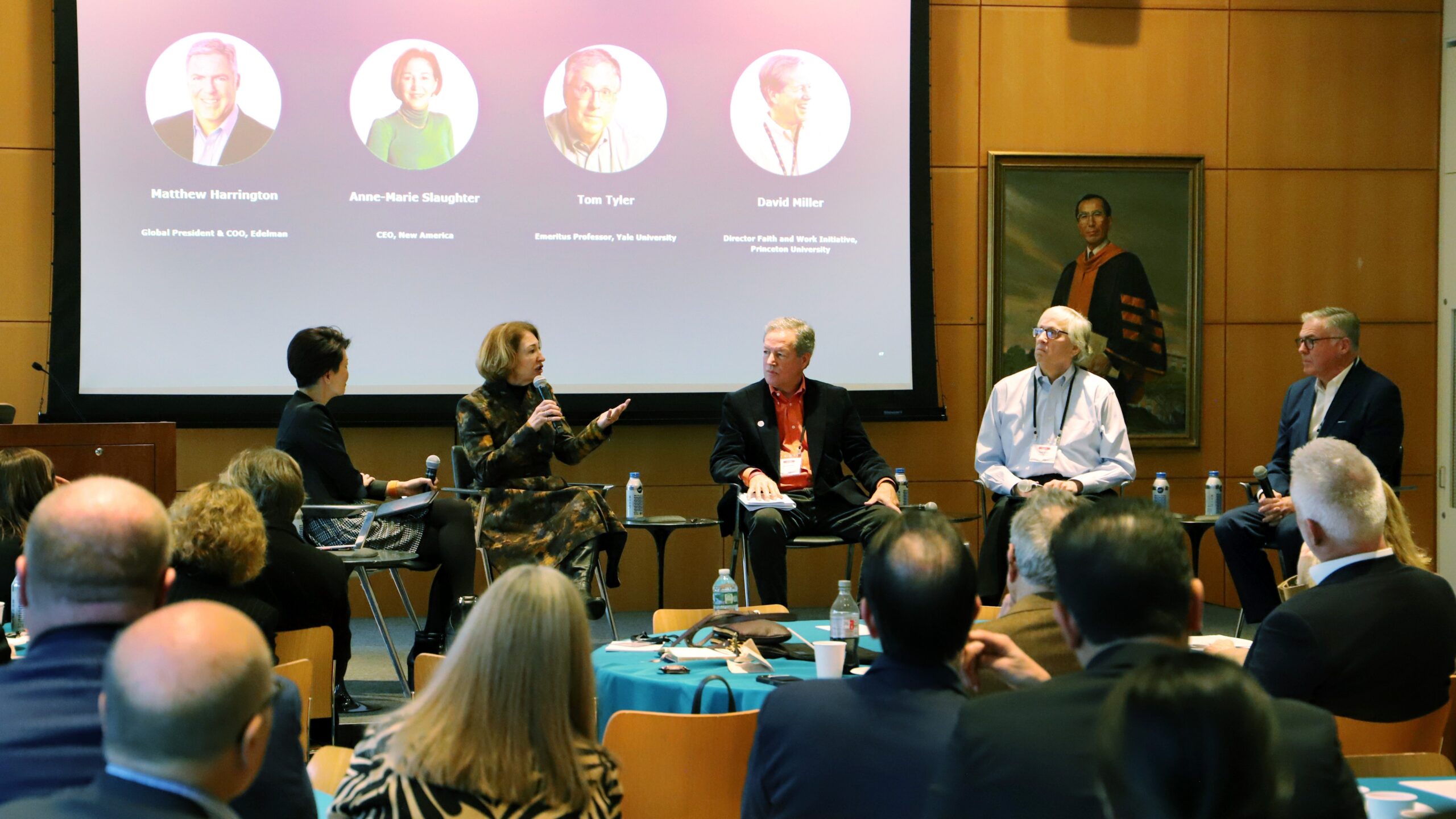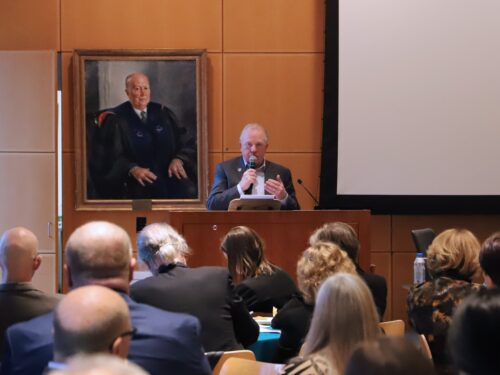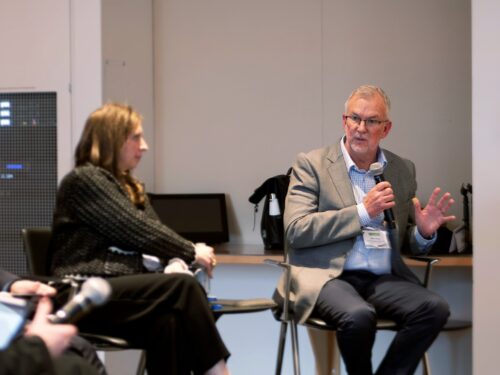
Industry-academic summit yields fruitful discussions about trust in the energy sector
Seated around a table, a group of energy executives role-playing as stakeholders seeking approval for a hypothetical energy project were reminded of the value of conversation in building trust. Faced with nongovernmental organizations (NGOs) and researchers acting as members of the local community, it became obvious that by listening, engaging, understanding, and empathizing with other stakeholders’ views, consensus on difficult issues could be found, resulting in better outcomes, faster resolution, and more successful projects.
“We thought we were doing the right thing by just telling the community about our plans, but it wasn’t working,” said one participant who played the part of a project developer. “So we listened. We heard their concerns, answered their questions, and even adjusted plans. We provided context. We talked about community benefits. And that’s when we started to earn their trust.”
The activity was part of a day-long industry-academic summit organized to explore the role of trust in either speeding up or slowing down the energy transition. Co-organized by the Andlinger Center for Energy and the Environment and Worley, the From Ambition to Reality Summit convened over 60 energy and related infrastructure executives, government representatives, NGOs, and researchers to identify how investing in trust-building might accelerate the clean energy transition and discuss ways to restore, maintain, and build the trust needed to meet international climate targets.

The summit — the second of its kind — was based around the fourth installment of From Ambition to Reality, a series of thought leadership articles from the Andlinger Center and Worley that identifies the paradigm shifts in infrastructure delivery practices necessary for bridging the considerable gap between net-zero goals and current energy transition progress.
“The way the world delivers energy infrastructure moving forward has to be different from the way it’s been done in the past, or else the world will not come close to meeting its climate targets,” said Chris Ashton, CEO of Worley, in his opening remarks to summit attendees. “Trust must play a fundamental role on that journey forward. Progress can be made far more quickly, with much greater certainty, if we can trust each other.”
Integrity, competence, and the power of listening
People evaluate trust across at least two dimensions: integrity and competence. Integrity refers to the belief that someone will do the right thing, while competence refers to the belief that someone can follow through on their commitments.
Matthew Harrington, global president and chief operating officer at communications firm Edelman, said that the two dimensions operate as a sort of Venn diagram. The highest levels of trust occur when integrity and competence intersect. However, one or the other often dominates. For instance, according to the 2024 Edelman Trust Barometer, people tend to rate NGOs high on integrity but lower on competence, while businesses are seen as having high competence but lower integrity.
Speakers suggested that integrity-based trust is often a limiting factor in the delivery of new energy projects, from renewables and transmission to carbon capture and storage. Due to a history of varied levels of engagement and transparency, local communities, NGOs, and other stakeholders like suppliers and regulators are frequently suspicious of the motives of prospective project developers.
“I’ve seen numerous energy projects end before they even began,” said Mary Lou Lauria, Senior Vice President of Global Environment & Sustainability at Worley. “They were technically feasible and financially sound. They had the experts and supply chain all lined up. But they failed because the community had been ill-informed and brought late to the table, and no process had been applied to build the necessary relationship with community.”
Panelists agreed that listening and responding to community concerns are critical to building, maintaining, and restoring trust between energy project stakeholders. The 2024 Edelman Trust Barometer identifies listening as a top trust-building skill across institutions, from government and NGOs to private businesses and the media.
“The best way to build trust is to show people that what they feel matters, that their concerns are important to you,” said Tom Tyler, the Macklin Fleming Professor Emeritus of Law and founding director of the Justice Collaboratory. “People are more likely to accept a decision — even if it is not in line with their interests — if they feel that the process to reach that decision was fair.”
From ambition, back to reality
Despite its importance to the success of energy projects, many speakers agreed that current industry practices do little to strengthen — and often much to harm — stakeholder trust.
For instance, some companies have pushed energy projects under the radar as long as they can, bringing in local communities only when required or discovered. When community resistance appears, some companies also fall back on the power of eminent domain, which allows them to seize private property (in exchange for compensation to landowners) to build energy infrastructure deemed beneficial to the public.
While these tactics might succeed for one project, they can destroy trust between developers and local communities and lower the likelihood that future projects will be successful. Furthermore, the entire energy sector often bears the consequences of that trust deficit, even if it comes from just one bad actor.
“If you want to doom future energy projects in a state, that’s the way to do it,” said one of the day’s speakers.
However, some speakers expressed optimism about the future. They pointed to greater efforts toward visibility and transparency as companies increasingly see themselves as part of the communities in which they operate and witness the long-term benefits of building and maintaining trust between stakeholders.
At the same time, companies have recognized that forming cross-institutional partnerships raises their credibility and helps them efficiently navigate regulatory processes.
“Issues like climate change, food insecurity, and water insecurity are problems without passports. They don’t stop at country borders,” said Anne-Marie Slaughter, CEO of New America and the Bert G. Kerstetter ’66 University Professor of Politics and International Affairs, Emeritus at Princeton University. “For these problems, you really need to be creating strong partnerships across countries and institutions. You need governments, businesses, and NGOs all working together.”
A space for candid conversations
The day’s discussions took place under Chatham House Rule to encourage authentic and open communication between attendees. Indeed, many summit attendees remarked that the event permitted them to speak with an openness and authenticity that is seldom allowed in their professional lives, leading to more constructive discussions.
“I participate in many energy related conferences and workshops each year,” said Andre Argenton, Chief Sustainability Officer and Vice President of Environmental Health and Safety at Dow. “This meeting was truly unique — the level of people, the size, and the environment was perfect to support open, authentic, and important conversations.”

Summit co-organizer Chris Greig, the Theodora D. ’78 & William H. Walton III ’74 Senior Research Scientist in the Andlinger Center for Energy and the Environment, said that one of the Andlinger Center’s key strengths is its convening ability.
“One of the privileges of being at the Andlinger Center and Princeton is our ability to engage some of the strongest leaders around the world’s thorniest challenges,” said Greig, who is also the associate director for external partnerships at the Andlinger Center. “Creating a safe space where people are willing to engage authentically and be vulnerable, was, in my opinion, one of the most rewarding aspects of the summit.”
Greig and his colleagues at Princeton and Worley intend to use the discussions and takeaways from the summit to inform their Infrastructure for Trust project, which explores how durable trust can be systematically built and maintained to deliver energy infrastructure at the speed and scale required to meet global climate targets.
Worley is a charter member of the Princeton E-ffiliates Partnership (E-ffiliates), a corporate membership program administered by the Andlinger Center for Energy and the Environment to foster collaboration between academia and industry and drive meaningful innovation toward a sustainable energy future.